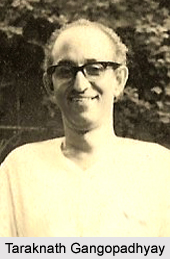 Taraknath Gangopadhyay (1918-1970) was a renowned author. He was born in Dinajpur He received his B.A. from Brojomohun College of Barisal. He has taught at two colleges in West Bengal and later became a teacher of the University of Calcutta. He experimented in short stories which were published in Shonibaarer chithi that was a literary magazine in Kolkata at that time. He also wrote for the reputed literary magazine Desh. His most attractive creation was the Tenida stories. He died in 1970 in Kolkata, India.
Taraknath Gangopadhyay (1918-1970) was a renowned author. He was born in Dinajpur He received his B.A. from Brojomohun College of Barisal. He has taught at two colleges in West Bengal and later became a teacher of the University of Calcutta. He experimented in short stories which were published in Shonibaarer chithi that was a literary magazine in Kolkata at that time. He also wrote for the reputed literary magazine Desh. His most attractive creation was the Tenida stories. He died in 1970 in Kolkata, India.
Literary works of Taraknath Gangopadhyay
His first story was published in `Bichitra`. His novels are: Uponibesh-1, Uponibesh-2, Uponibesh-3, Somrat O Sreshthi, Mantramukhar, Mohananda, Swarnaseeta, Trophy, Lalmati, Krishnapakkha, Bidushok, Boitalik, Shilalipi, Oshidhara,Vatiali, Podoshonchar, Amabossar Gan and Alokporna.
The Story Collections written by him are: Golposongroho, Saper Mathay Moni, Sreshto Golpo and Swanirbachito Golpo.
The Dramas include: Rammohon, Varate Chai and Agontuk. His single satire composition is Sunandar Journal
The Essays authored by him are: Sahitye Chotogolpo, Bangla Golpo Bichitra, Chotogolper Shimarekha and Kothakobid Rabindranath
He has also composed stories for children and they are: Charmurti, Charmurtir Abhijan, Abyartha Lokhyobhed Ebong, Jhaubanglar Rohosyo, Kombol Niruddesh, Tenida o Sindhughotok, Porer Upokar Korio na (Drama) and Tenida Somogro
This article is a stub. You can enrich by adding more information to it. Send your Write Up to content@indianetzone.com



















